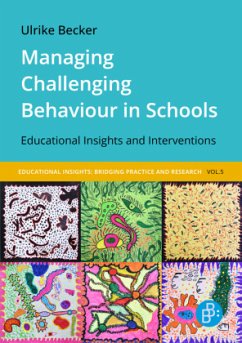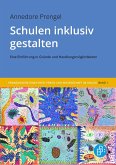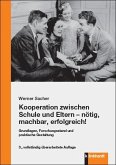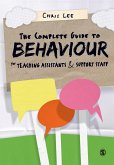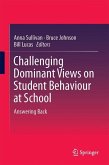- Broschiertes Buch
- Merkliste
- Auf die Merkliste
- Bewerten Bewerten
- Teilen
- Produkt teilen
- Produkterinnerung
- Produkterinnerung
Auffälliges Verhalten von Kindern und Jugendlichen im schulischen Alltag zeugt oftmals von den schwierigen Lebenssituationen, in denen sie aufwachsen. Für Lehr- und pädagogische Fachkräfte stellt der Umgang mit den daraus resultierenden Konflikten die größte Herausforderung dar. In diesem Buch werden Ansätze und Lösungen für das Verstehen und Handeln in schwierigen pädagogischen Situationen in der Schule vorgestellt. Außerdem bietet ein inklusiver Förderansatz Impulse für die Schulentwicklung zur Prävention auffälligen Verhaltens.
Andere Kunden interessierten sich auch für
![Auffälliges Verhalten in der Schule Auffälliges Verhalten in der Schule]() Ulrike BeckerAuffälliges Verhalten in der Schule14,90 €
Ulrike BeckerAuffälliges Verhalten in der Schule14,90 €![Schulen inklusiv gestalten Schulen inklusiv gestalten]() Annedore PrengelSchulen inklusiv gestalten16,90 €
Annedore PrengelSchulen inklusiv gestalten16,90 €![Transnationale Europabildung in Grenzregionen Transnationale Europabildung in Grenzregionen]() Transnationale Europabildung in Grenzregionen78,00 €
Transnationale Europabildung in Grenzregionen78,00 €![Kulturelle Bildung in ländlichen Räumen Kulturelle Bildung in ländlichen Räumen]() Kulturelle Bildung in ländlichen Räumen59,90 €
Kulturelle Bildung in ländlichen Räumen59,90 €![Kooperation zwischen Schule und Eltern - nötig, machbar, erfolgreich! Kooperation zwischen Schule und Eltern - nötig, machbar, erfolgreich!]() Werner SacherKooperation zwischen Schule und Eltern - nötig, machbar, erfolgreich!21,90 €
Werner SacherKooperation zwischen Schule und Eltern - nötig, machbar, erfolgreich!21,90 €![The Complete Guide to Behaviour for Teaching Assistants and Support Staff The Complete Guide to Behaviour for Teaching Assistants and Support Staff]() Chris LeeThe Complete Guide to Behaviour for Teaching Assistants and Support Staff32,99 €
Chris LeeThe Complete Guide to Behaviour for Teaching Assistants and Support Staff32,99 €![Challenging Dominant Views on Student Behaviour at School Challenging Dominant Views on Student Behaviour at School]() Challenging Dominant Views on Student Behaviour at School75,99 €
Challenging Dominant Views on Student Behaviour at School75,99 €-
-
-
Auffälliges Verhalten von Kindern und Jugendlichen im schulischen Alltag zeugt oftmals von den schwierigen Lebenssituationen, in denen sie aufwachsen. Für Lehr- und pädagogische Fachkräfte stellt der Umgang mit den daraus resultierenden Konflikten die größte Herausforderung dar. In diesem Buch werden Ansätze und Lösungen für das Verstehen und Handeln in schwierigen pädagogischen Situationen in der Schule vorgestellt. Außerdem bietet ein inklusiver Förderansatz Impulse für die Schulentwicklung zur Prävention auffälligen Verhaltens.
Produktdetails
- Produktdetails
- Pädagogische Einsichten: Praxis und Wissenschaft im Dialog 5
- Verlag: Verlag Barbara Budrich
- Artikelnr. des Verlages: 13412
- Seitenzahl: 113
- Erscheinungstermin: 28. März 2025
- Englisch
- Abmessung: 5mm x 149mm x 211mm
- Gewicht: 170g
- ISBN-13: 9783847431077
- Artikelnr.: 71509899
- Herstellerkennzeichnung Die Herstellerinformationen sind derzeit nicht verfügbar.
- Pädagogische Einsichten: Praxis und Wissenschaft im Dialog 5
- Verlag: Verlag Barbara Budrich
- Artikelnr. des Verlages: 13412
- Seitenzahl: 113
- Erscheinungstermin: 28. März 2025
- Englisch
- Abmessung: 5mm x 149mm x 211mm
- Gewicht: 170g
- ISBN-13: 9783847431077
- Artikelnr.: 71509899
- Herstellerkennzeichnung Die Herstellerinformationen sind derzeit nicht verfügbar.
Introduction1. Education in times of social crisis1.1 Psychosocial situation of children and adolescents against the background of social crises1.2 School as a resilience factor1.2.1 Classroom teaching1.2.2 (Digital) learning at a distance1.2.3 Closeness and distance in the educational relationship1.3 Conclusion2. Pupils with aggressive behaviour: Behaviour towards teachers2.1 Theoretical considerations2.2 Educational attitude2.3 Cuts as solutions in everyday school life2.3.1 Reset2.3.2 From confrontation to closing unity2.3.3 Paradoxical intervention2.3.4 Redirect2.3.5 Going out2.3.6 Safe storage of dangerous objects2.3.7 Place swap2.3.8 Individual work order2.3.9 Time Out2.3.10 Trigger acoustic signal2.4 Reparation instead of punishment2.5 Conclusion3. Pupils harm others3.1 Theoretical considerations3.2 Solutions for conflicts in everyday school life3.2.1 Reactivation of sibling conflicts3.2.2 Neglect3.2.3 Bullying3.2.4 Stigmatisation3.2.5 Discrimination because of clan family names3.2.6 Non-compliance with rules of faith3.3 Conclusion4. Pupils harm themselves4.1 Theoretical considerations4.2 Solutions for conflicts in everyday school life4.2.1 Sensory overload4.2.2 Separation anxiety4.2.3 Self-harming behaviour such as scratching4.2.4 Hyperactivity4.2.5 Individual retreat4.2.6 Blows to your own body4.3 Conclusion5. Parents who are difficult to reach5.1 Legal framework for working with parents5.2 Effect of parents on children s behaviour5.3 Hard to reach parents5.3.1 Causes of difficult accessibility5.3.2 Solutions for conversations with parents5.4 Conclusion6. Prevention of challenging behaviour and conflicts6.1 Prevention of challenging behaviour6.2 School policy6.3 School rules6.4 Conclusion7. Learning accesses for pupils with special needs in their emotional and social development7.1 Inclusive and exclusive currents7.2 Transition project7.2.1 Theoretical background7.2.2 Study results7.2.3 Internal school organisation7.2.4 Exchange and dissemination7.3 Five learning accesses7.3.1 Temporary learning group7.3.2 Inclusive teaching7.3.3 Counselling in a multi-professional team7.3.4 Counselling with parents7.3.5 Cooperation between schools and youth welfare services7.4 Conclusion8. Summary and outlook8.1 Summary8.2 OutlookLiteratureIndex
Introduction1. Education in times of social crisis1.1 Psychosocial situation of children and adolescents against the background of social crises1.2 School as a resilience factor1.2.1 Classroom teaching1.2.2 (Digital) learning at a distance1.2.3 Closeness and distance in the educational relationship1.3 Conclusion2. Pupils with aggressive behaviour: Behaviour towards teachers2.1 Theoretical considerations2.2 Educational attitude2.3 Cuts as solutions in everyday school life2.3.1 Reset2.3.2 From confrontation to closing unity2.3.3 Paradoxical intervention2.3.4 Redirect2.3.5 Going out2.3.6 Safe storage of dangerous objects2.3.7 Place swap2.3.8 Individual work order2.3.9 Time Out2.3.10 Trigger acoustic signal2.4 Reparation instead of punishment2.5 Conclusion3. Pupils harm others3.1 Theoretical considerations3.2 Solutions for conflicts in everyday school life3.2.1 Reactivation of sibling conflicts3.2.2 Neglect3.2.3 Bullying3.2.4 Stigmatisation3.2.5 Discrimination because of clan family names3.2.6 Non-compliance with rules of faith3.3 Conclusion4. Pupils harm themselves4.1 Theoretical considerations4.2 Solutions for conflicts in everyday school life4.2.1 Sensory overload4.2.2 Separation anxiety4.2.3 Self-harming behaviour such as scratching4.2.4 Hyperactivity4.2.5 Individual retreat4.2.6 Blows to your own body4.3 Conclusion5. Parents who are difficult to reach5.1 Legal framework for working with parents5.2 Effect of parents on children s behaviour5.3 Hard to reach parents5.3.1 Causes of difficult accessibility5.3.2 Solutions for conversations with parents5.4 Conclusion6. Prevention of challenging behaviour and conflicts6.1 Prevention of challenging behaviour6.2 School policy6.3 School rules6.4 Conclusion7. Learning accesses for pupils with special needs in their emotional and social development7.1 Inclusive and exclusive currents7.2 Transition project7.2.1 Theoretical background7.2.2 Study results7.2.3 Internal school organisation7.2.4 Exchange and dissemination7.3 Five learning accesses7.3.1 Temporary learning group7.3.2 Inclusive teaching7.3.3 Counselling in a multi-professional team7.3.4 Counselling with parents7.3.5 Cooperation between schools and youth welfare services7.4 Conclusion8. Summary and outlook8.1 Summary8.2 OutlookLiteratureIndex

